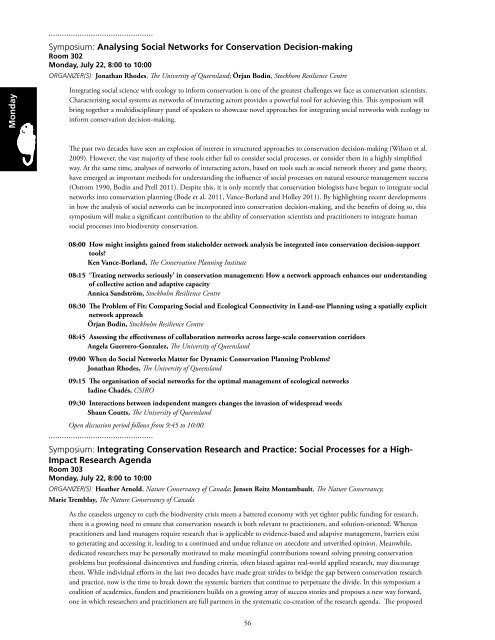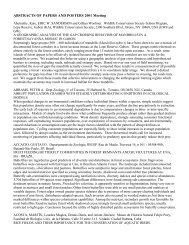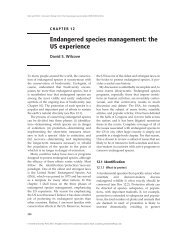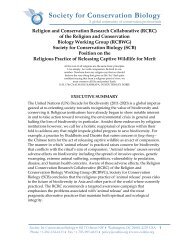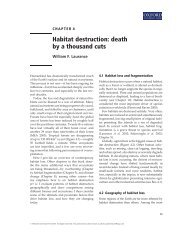ICCB 2013 Program - Society for Conservation Biology
ICCB 2013 Program - Society for Conservation Biology
ICCB 2013 Program - Society for Conservation Biology
Create successful ePaper yourself
Turn your PDF publications into a flip-book with our unique Google optimized e-Paper software.
...............................................<br />
Symposium: Analysing Social Networks <strong>for</strong> <strong>Conservation</strong> Decision-making<br />
Room 302<br />
Monday, July 22, 8:00 to 10:00<br />
Organizer(s): Jonathan Rhodes, The University of Queensland; Örjan Bodin, Stockhom Resilience Centre<br />
Monday<br />
Integrating social science with ecology to in<strong>for</strong>m conservation is one of the greatest challenges we face as conservation scientists.<br />
Characterising social systems as networks of interacting actors provides a powerful tool <strong>for</strong> achieving this. This symposium will<br />
bring together a multidisciplinary panel of speakers to showcase novel approaches <strong>for</strong> integrating social networks with ecology to<br />
in<strong>for</strong>m conservation decision-making.<br />
The past two decades have seen an explosion of interest in structured approaches to conservation decision-making (Wilson et al.<br />
2009). However, the vast majority of these tools either fail to consider social processes, or consider them in a highly simplified<br />
way. At the same time, analyses of networks of interacting actors, based on tools such as social network theory and game theory,<br />
have emerged as important methods <strong>for</strong> understanding the influence of social processes on natural resource management success<br />
(Ostrom 1990, Bodin and Prell 2011). Despite this, it is only recently that conservation biologists have begun to integrate social<br />
networks into conservation planning (Bode et al. 2011, Vance-Borland and Holley 2011). By highlighting recent developments<br />
in how the analysis of social networks can be incorporated into conservation decision-making, and the benefits of doing so, this<br />
symposium will make a significant contribution to the ability of conservation scientists and practitioners to integrate human<br />
social processes into biodiversity conservation.<br />
08:00 How might insights gained from stakeholder network analysis be integrated into conservation decision-support<br />
tools<br />
Ken Vance-Borland, The <strong>Conservation</strong> Planning Institute<br />
08:15 ‘Treating networks seriously’ in conservation management: How a network approach enhances our understanding<br />
of collective action and adaptive capacity<br />
Annica Sandström, Stockholm Resilience Centre<br />
08:30 The Problem of Fit: Comparing Social and Ecological Connectivity in Land-use Planning using a spatially explicit<br />
network approach<br />
Örjan Bodin, Stockholm Resilience Centre<br />
08:45 Assessing the effectiveness of collaboration networks across large-scale conservation corridors<br />
Angela Guerrero-Gonzalez, The University of Queensland<br />
09:00 When do Social Networks Matter <strong>for</strong> Dynamic <strong>Conservation</strong> Planning Problems<br />
Jonathan Rhodes, The University of Queensland<br />
09:15 The organisation of social networks <strong>for</strong> the optimal management of ecological networks<br />
Iadine Chadés, CSIRO<br />
09:30 Interactions between independent mangers changes the invasion of widespread weeds<br />
Shaun Coutts, The University of Queensland<br />
Open discussion period follows from 9:45 to 10:00.<br />
...............................................<br />
Symposium: Integrating <strong>Conservation</strong> Research and Practice: Social Processes <strong>for</strong> a High-<br />
Impact Research Agenda<br />
Room 303<br />
Monday, July 22, 8:00 to 10:00<br />
Organizer(s): Heather Arnold, Nature Conservancy of Canada; Jensen Reitz Montambault, The Nature Conservancy;<br />
Marie Tremblay, The Nature Conservancy of Canada<br />
As the ceaseless urgency to curb the biodiversity crisis meets a battered economy with yet tighter public funding <strong>for</strong> research,<br />
there is a growing need to ensure that conservation research is both relevant to practitioners, and solution-oriented. Whereas<br />
practitioners and land managers require research that is applicable to evidence-based and adaptive management, barriers exist<br />
to generating and accessing it, leading to a continued and undue reliance on anecdote and unverified opinion. Meanwhile,<br />
dedicated researchers may be personally motivated to make meaningful contributions toward solving pressing conservation<br />
problems but professional disincentives and funding criteria, often biased against real-world applied research, may discourage<br />
them. While individual ef<strong>for</strong>ts in the last two decades have made great strides to bridge the gap between conservation research<br />
and practice, now is the time to break down the systemic barriers that continue to perpetuate the divide. In this symposium a<br />
coalition of academics, funders and practitioners builds on a growing array of success stories and proposes a new way <strong>for</strong>ward,<br />
one in which researchers and practitioners are full partners in the systematic co-creation of the research agenda. The proposed<br />
56


